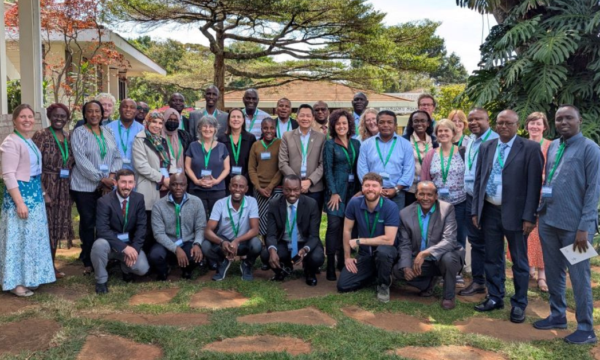
CABI has joined forces with the Pest Control Products Board (PCPB) and aak-GROW to deliver a five-day workshop aimed at demystifying the Kenyan efficacy and residue data extrapolation and crop grouping guidelines.
In total, 30 registration officers from various organization participated in the training.
The workshop was delivered, in part through the CABI-led PlantwisePlus programme, for registration officers from the agro-chemical industry to increase the utilization of these guidelines. This is to achieve timely pest control product registration and facilitate registration of pest control products for use on minor crops.
All pest control products are required to be registered in accordance with Pest Control Products Act Cap 346, Laws of Kenya before they can be imported, traded and used in Kenya. Extensive data packages are required for registration of these products to allow reliable risk assessment and justify their use.
Lack of requisite data may lead to lack of authorization of products
The current practice in Kenya requires that applicants submit efficacy and residue data for each target pest on each specific crop. Lack of requisite data may lead to lack of authorization of products for the market, especially those addressing minor issues.
PCPB has a mandate to improve access to safe and efficacious pest control products. One of the ways that demonstrates this commitment is through the development of guidelines for efficacy and residue data extrapolation and crop grouping.
The PCPB, in collaboration with the Agrochemical industry and other stakeholders, developed efficacy and residue data extrapolation guidelines which allow for the existing authorization to be extended to include additional crops or pests without requiring generation of new/specific data.
Facilitate the approval of pest control products for minor uses
Dr Naphis Bitange, Postdoctoral Fellow-Systems Agronomist at CABI, said, “This reduces the cost of product registration, and the time required in the process. An additional benefit is also to facilitate the approval of pest control products for minor uses.
“Although these guidelines were developed and approved for use by PCPB, there has been a very slow uptake of the guidelines by the agrochemical companies. This has been attributed to low understanding and interpretation of the guidelines and therefore the need for capacity building.”
He said the guidelines offer a cost effective and time saving option of pest control product registration without conducting specific field trials.
Frederick Muchiri, CEO of the PCPB, opened the workshop. He expressed concerns over a lack of utilization of efficacy and residue data extrapolation by the agrochemical companies even after a sensitization meeting in 2022 on the guidelines.
Cost and time saving option for pest control products registration
He said the PCPB will be expecting to receive applications for the registration of pest control products using the guidelines following the training which includes applications for minor crops as a cost and time saving option for pest control products registration.
Meanwhile, Eric Kimunguyi, CEO of aak-GROW, emphasized the need to provide solutions that reduce the cost of farming. He expressed concerns about the low uptake and implementation of crop grouping guidelines by the agrochemical industry despite the guidelines being developed and available for use for some time.
He reiterated the need to implement the guidelines to address the availability of low risk plant protection products and reduce the time taken for registration of pest control products.
Linda Amondi Ohulo, from Export Trading Group (ETG), Kenya, said, “The guidelines were introduced but the exposure to each tool wasn’t tackled well so we didn’t get clarity back then. We are thankful that CABI has supported this training workshop to enhance umderstanding and to help us get more clarity and we are sure that we are now equipped to use the tools as guided.”
The workshop closed with a number of recommendations moving forward. These included the need to educate efficacy trial institutions on the data extrapolation guidelines.

Additional information
Main image: In total, 30 registration officers from various organization participated in the training aimed at demystifying the Kenyan efficacy and residue data extrapolation and crop grouping guidelines.
Relevant story
Related News & Blogs
Training delivered on early warning system using Earth Observation data to help manage crop pest pests in Kenya
CABI has teamed up with the Kenya Agricultural & Livestock Organization (KALRO) to deliver training aimed at helping smallholder maize, bean and tomato farmers understand important crop pest alerts derived from Earth Observation data. Experts in di…
30 April 2025




